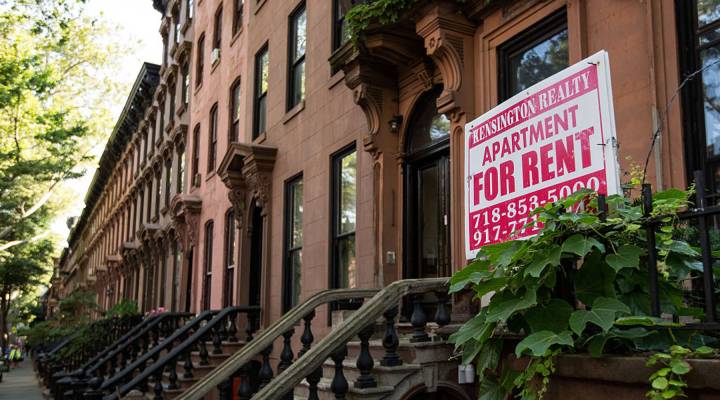
New York is betting $155 million that it can cut evictions
New York is betting $155 million that it can cut evictions

At New York City’s housing court in downtown Brooklyn, where judges preside over landlord-tenant disputes, about 30 people stand in line, waiting to speak to a clerk. They’re representing themselves in court.
“This is the kind of bottleneck entry point to housing court,” said Sergio Jimenez, an attorney at the nonprofit Brooklyn Defender Services.
“All of the landlords have attorneys,” he said, flipping through a list of the day’s cases, counting. “Landlord’s attorney, landlord’s attorney, landlord’s attorney, one tenant attorney…”
Ninety-nine percent of landlords in New York City eviction cases have lawyers. Just 27 percent of tenants do.
Without a lawyer, tenants are at a disadvantage, Jimenez said. “Most of the time you’ll be going up against somebody who’s been doing this for decades, knows all the judges, knows all the court staff, knows the system,” he said.
| Renting becomes a lifestyle for the long haul |
| Myths around homebuying: the dreaded 20 percent and millennial apathy |
New York City recently passed a law, to be phased in over five years, funding free legal services for residents who are facing eviction and fall below a certain income threshold — about $49,000 a year for a family of four. The city is spending $155 million annually on the lawyers.
A lawyer can help tenants make sense of the confusing set of federal, state and city laws that govern housing, said Judith Goldiner, who heads the civil law reform unit at the Legal Aid Society, a nonprofit legal services provider.
“Having an attorney can really make the difference between someone who can save their apartment and someone who can’t,” Goldiner said.
Harry Michel, who’s 64 and lives in Queens, is an example of why having a lawyer matters. He fought off eviction a few years ago. The father of a young son, Michel was living with his brother, William, and his mother, who was terminally ill.
“I was taking care of her during the day while he was at work and also caring for my son,” he said.
Then his brother had an accident and ended up in a coma. Michel fell behind on the rent and his landlord sued him.
“I was bewildered,” he said. “I didn’t know what to do.”
A lawyer from Legal Aid Society took on the case, helping him get a rent subsidy from the city and negotiating for him to stay in the apartment longer. That gave him the chance to get a license to drive for Uber and to find a new apartment with his son.
“If I didn’t have representation, we literally would have been homeless,” Michel said.
More than 59,000 people sleep in New York City’s homeless shelters every night. The new law could help people stay in their homes instead, said Steven Banks, commissioner of the city’s Department of Social Services. And there’s an economic argument for that, he said.
“To spend a couple of thousand dollars to provide legal services versus tens of thousands of dollars to provide shelter makes this a very good investment,” Banks said.
Joseph Strasburg, who heads the landlord advocacy group the Rent Stabilization Association, questions the wisdom of the law. A lawyer might just delay an inevitable eviction, and that could hurt property owners, he said.
“Look at what happens,” Strasburg said. “The owner is out of rent for months, which has an impact on their ability to put money back into the building, pay off their real estate taxes, and how about their mortgage?”
Even tenants with a lawyer have to come up with the rent money, Strasburg said.
There’s a lot happening in the world. Through it all, Marketplace is here for you.
You rely on Marketplace to break down the world’s events and tell you how it affects you in a fact-based, approachable way. We rely on your financial support to keep making that possible.
Your donation today powers the independent journalism that you rely on. For just $5/month, you can help sustain Marketplace so we can keep reporting on the things that matter to you.












